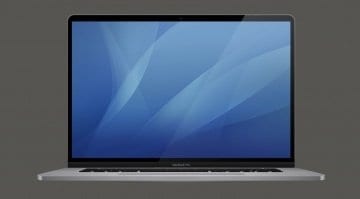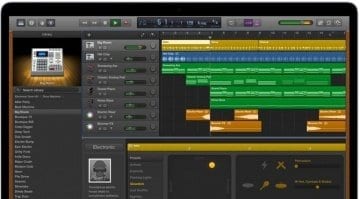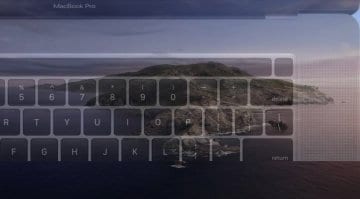macOS Catalina will break most of your music apps and equipment on its launch
Getting a thoroughly renovated operating system for free, yearly, and on devices dating as far back as 2012 is all kinds of wonderful, but it’s not without repercussions. At best, Mac users working with specialized software and equipment usually postpone the yearly update until all drivers, apps, and plug-ins they use are deemed compatible. At worst, they fight the update tooth and claw, as daring to transition means sabotaging their work indefinitely. Alas, the decisions Apple has to face throughout development sometimes have major consequences.
Two years ago, macOS High Sierra brought perfectly healthy Macs to a crawl, sparking outrage. Coming this October, macOS Catalina will break most, if not all of your music apps and equipment upon launch while doubling down on those annoying security prompts that seem to question every step of your workflow. It’s no ill will, it’s the ills of modern computing.
An exact culprit is difficult to pinpoint. It’s more of a combination of abandoning 32-bit code altogether, even stricter app runtime and installer notarization practices, a complete refusal to accept unverified drivers, and the yet unanswered question of how DJs will integrate their iTunes library with DJ software once iTunes gets the axe. This stuff breaks music software and other “pro” apps in one or more of the following ways:
Applications that still employ 32-bit software components due to legacy compatibility, developer laziness or whatever reason have to be updated to full-on 64-bit code before they are compatible with macOS Catalina. Whether the current software version you own will be migrated to full 64-bit, or a new paid upgrade will be issued instead is entirely up to the developer. For example, Ableton Live 9 will cease functioning under Catalina and no update will be provided. If you want to run Live under Catalina, you must own version 10.
Breaking DAWs and Plug-ins
The notarization and hardened runtime policies in Catalina break DAWs and plug-ins in weird and unpredictable ways. Routine file and memory access procedures that happen to mirror common malware behavior either don’t work or require explicit user approval. Thorough updates are in order to ensure compatibility. PreSonus, for example, announced its Studio One DAW and third-party plug-ins from after June 1, 2019 must be updated for Catalina and probably won’t work upon launch. Older plug-ins likely won’t load unless they are signed by Apple.
PreSonus is joined by the likes of Numark, Serato, Slate Digital, and Native Instruments who are also asking users to hold off from updating. In Native’s case, none of its products will be compatible at launch, and the strict security forever breaks the installers for Komplete 8 – 10 on HDDs and DVDs. Enjoy leeching those gigabytes of content from Native Access – I sincerely hope you have speedy internet where you live.
While attempting to run “unverified” installers and software that work in Mojave is still possible with a manual override, that’s not the case with device drivers. Drivers and their installers that are not built for Catalina are completely off limits, so if you own legacy hardware that still works under your version of macOS but is no longer maintained, you are stuck. In the pro audio world, new isn’t always better, but it’s guaranteed to be more expensive, so this isn’t a simple case of “get with the times”. The light in the tunnel is that class-compliant devices will continue functioning as normal, unless they require specialized drivers or applications.
Finally, Apple is retiring iTunes for the streamlined Music app, which is mostly good news except for Music’s lack of ability to communicate with DJ apps at launch. While iTunes could seamlessly share its music library with other apps, the new Music app has you exporting an .xml file to import back into your DJ app, and you are supposed to do this manually each time your music library changes. Reportedly, Apple and DJ software makers are figuring out something better than what was possible with those ancient .xml files – though if something isn’t broken or due for improvement in a meaningful way, why even touch it?
What are your options?
It’s clear that you shouldn’t switch to Catalina as your sole operating system until you get the e-mails that your products are officially compatible. In the meantime, you can also dual-boot Catalina and an older macOS/OS X version that’s stable and works for you.
If you insist on having Catalina at launch, be sure to thoroughly backup your computer with a disk cloning tool, Apple’s own Time Machine software, or even both. This way, you will be able to restore a working setup without too much of a hassle.
A systematic, gradual rollout of these drastic changes in place of delivering them all at once in a major update would have made for a smoother transition that’s more considerate of professional users and developers. However, we cannot know for sure if Apple really had the means to do better. Software development is incredibly complex, and with so many mission-critical systems intertwined and co-dependent, such a scenario is probably idyllic. Where it certainly could have done better, I believe anyone who’s bought a 2016 or later laptop from Apple knows maddeningly well.
3 responses to “macOS Catalina will break most of your music apps and equipment on its launch”










It should be pointed out that Apple’s hands were not forced at all into doing any of this. Apple now has a long history of inadvertantly breaking hardware when rolling out new versions of Mac OS. One could now say, oh, but you can’t expect Apple to test-drive new Mac OS versions against the thousands of devices that music producers use out there … but that’s actually the point:
For a company that’s touting how close they’d be to content creators, apparently they are not close at all.
There are many examples for this, such as external USB audio devices not working anymore because Apple changed the USB stack in Mac OS, or the security chip in all recent Macs causing latency spikes. Yes, Apple was quick to address those with updates, but they showcased that no testing with audio equipment was done at all before release.
People still look at Mac OS as this marvelous OS that’s magically sealed from all evils that haunt the Windows world, but in reality they’re no better than the worst of Windows in 2019. Apparently the times when Apple had this tightly QCed, ultra-stable OS are gone.
Inadvertent? Very little is inadvertent when you’ve got the kind of cash/resources Apple has.
Secondly, why shouldn’t Apple be expected to do adequate QA? The Mac ecosystem is hardly vast. It could very easily afford the staff to test all of that.
Planned obsolescence means profiting by breaking things like backward compatibility. It’s not just in Apple’s interest but in the interest of its developers who can sell you expensive “upgrades” constantly. Everyone wins but the consumer.
Please don’t apologize for Apple. It has so much money it’s almost unbelievable. There are so many ways it could afford to not break backward compatibility so often but it does so on purpose. For example, the PPC emulation from IBM that Apple licensed wasn’t any sort of security risk. Apple didn’t want to pay the fee.
One of things Steve Jobs was really adamant about was planned obsolescence. He had a completely different view of computing than Steve Wozniak. Wozniak wanted open expandable computers, computers with full OS transparency, slots, etc. Jobs wanted closed systems, as proprietary as possible. He even had the audacity of unveiling the “first Mac” to the tech press but used a 512K machine instead of the actual 128K machine that was to go on sale, so he could wow the crowd with speech synthesis — something the unexpendable 128K Mac that was actually to be available to the public couldn’t do for lack of RAM.
Who knows what kind of thing he would have tried if Apple hadn’t given him the heave-ho. Then, when he came back to unveil his closed system that broke backward compatibility (iMac) he was hailed as a hero. There was nothing heroic about it. His vision was to speed up planned obsolescence and one major tool in doing that, aside from getting rid of expansion, is to break software compatibility. Cook has taken anti-consumer practices further, as with his dongle-selling Macbook “Pro” machines, machines that went backward by dropping MagSafe as well. Apple, being a corporation, is going to get as much out of you as it can, providing as little benefit to you as possible. That’s a given. However, Apple has increasingly been willing to work more aggressively against professionals and serious computing folk, in favor of being a style company. $1000 monitor stands are the kind of thing that you get with that — when a computer company wants to market itself as the tech equivalent to couture. Well, for actual users who have work to get done, chasing avante garde fashion whims is going to be both overpriced and counterproductive.
Apple should never be given the benefit of the doubt because it is a corporation. They, by definition, are soulless financial entities designed to give us the least possible benefit for the pieces of our lives (called money) we given them. Unfortunately, the competition is so dismal that Apple feels it can be more aggressive about “sell less for more” these days.